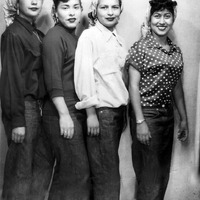-
Title
-
Women's Work Culture
-
Description
-
Many women found jobs in the canneries through other family members who worked at the same plant. Since little job training was provided, family members could offer advice on the use of equipment as well as how to work with supervisors. Lunching together, sharing babysitting, or traveling to work with family members strengthened kinship networks, and new friendships developed with people they may not have met outside the cannery. Unlike the men who worked in shipping, warehousing, or as equipment operators, before 1970, women did not view cannery jobs as a permanent occupation because there were few opportunities for training and advancement.
Women workers, no matter their background, shared mutual concerns about wages, working conditions, and poor supervisors. There was no time to socialize while on the assembly line or during brief breaks, and the noise made it hard to converse. In the 1930s, shared concerns over workplace safety and low wages led some Mexican women to become involved in union organizing efforts, including strikes, and to rely on social networks for support. “Women’s cannery work culture” made the daily routine easier because women shared their experiences, helping each other adjust to the challenges of the workplace.
-
Scholar Talk
-
https://vimeo.com/812986385
-
Identifier
-
B4SV Exhibit Topic Three: Slide 013
 Cannery Women Posing
Cannery Women Posing 
